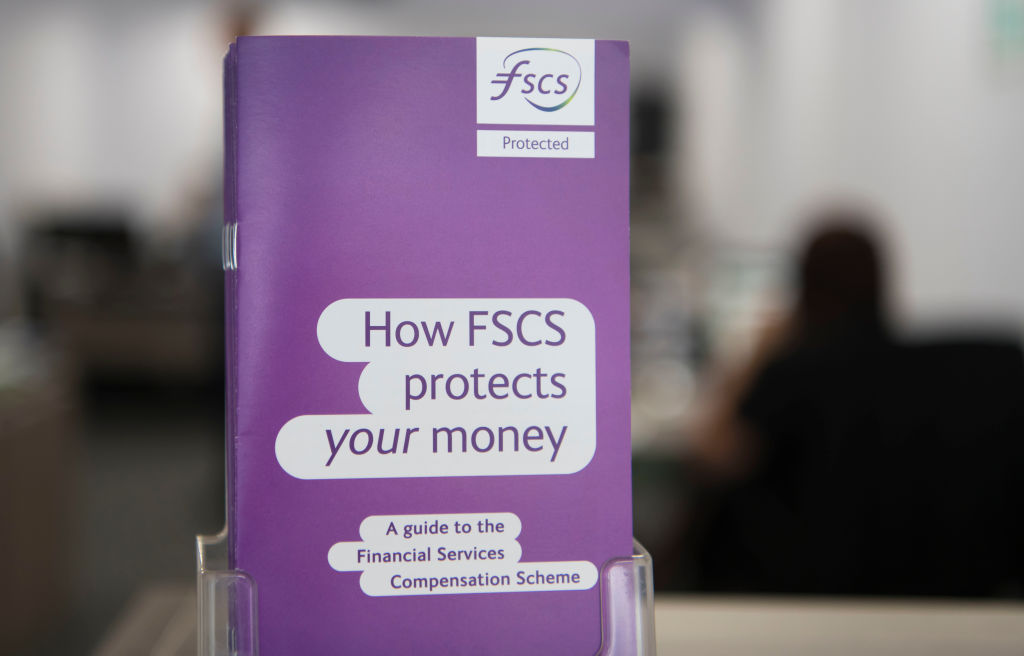What is the FSCS and how does it protect your savings and investments?
The Financial Services Compensation Scheme (FSCS) provides compensation for customers if a financial institution goes out of business. What is the limit and how does the scheme work?


Get the latest financial news, insights and expert analysis from our award-winning MoneyWeek team, to help you understand what really matters when it comes to your finances.
You are now subscribed
Your newsletter sign-up was successful
Want to add more newsletters?
When you put money into a bank, building society or other financial services, you want to know your money is safe should they go out of business.
The Financial Service Compensation Scheme (FSCS) is your safety-net, but it’s important to have a clear understanding of when you are covered, for how much and how to check.
Whether it’s savings, ISAs, current accounts or investment, the FSCS can protect you should the authorised bank or provider go bust.
MoneyWeek
Subscribe to MoneyWeek today and get your first six magazine issues absolutely FREE

Sign up to Money Morning
Don't miss the latest investment and personal finances news, market analysis, plus money-saving tips with our free twice-daily newsletter
Don't miss the latest investment and personal finances news, market analysis, plus money-saving tips with our free twice-daily newsletter
It was set up by the government in 2001 and is funded by the financial services industry. The scheme is independent, free to use and pays out compensation to consumers owed it.
We look at how the FSCS works, how much of your money it protects and how to ensure your cash is protected.
How does the FSCS work for savers?
The FSCS protects up to £120,000 of your cash in the event that the financial institution you use fails – so long as your provider is part of the FSCS.
Only those authorised by the Prudential Regulation Authority (PRA) and the Financial Conduct Authority (FCA) in the UK are covered. If you use a non-authorised provider, you will not be protected.
The £120,000 limit grows to £240,000 if you hold money in a joint account .
In some circumstances you may be able to claim more than the above limit if your bank balance is temporarily high, such as if you have just sold your house or received an inheritance.
In such situations, the limit can temporarily increase up to £1 million for six months from when you first deposited the amount. This is done through a temporary high balance (THB) claim, but note that this level of protection is not 100% guaranteed.
Both the £120,000 and £1 million limits apply “per financial institution”, which applies to different bank and building society brands that operate under the same licence.
For example, First Direct and HSBC operate under the same bank licence, and are therefore protected by the same FSCS coverage limit. So if you have a cash ISA with HSBC and a regular saver with First Direct, your total compensation for funds held across both banks will be capped at £120,000.
If your savings exceed £120,000, it is a good idea to spread your money across different banking groups to maximise protection.
Bank and pension provider collapses might be relatively rare, but they do happen. Having two accounts with two providers will reduce the risks of losing access to your money for whatever reason.
The FSCS recovered £56 million from failed financial institutions over 2024/25.
You can check the FSCS’s banking and savings checker to see if your provider is protected.
How does the FSCS work for investors?
If your stockbroker, financial adviser or investment firm goes out of business and there is a shortfall in client assets – in other words, money that should be in a segregated account turns out not to be – then the FSCS will protect you.
FSCS provides compensation of up to £85,000 per client (not per account) to top up whatever can be recovered.
Note that the FSCS protection varies depending on the type of product, and not all investment products are protected. You can use the FSCS investment protection checker to see if your product is covered.
For example, if a stockbroker owes you £70,000, but you only get back £40,000, you should be entitled to another £30,000 from the FSCS.
However, if you have two accounts with the same broker holding £70,000 and £120,000 respectively, and you get back £40,000 for each, the FSCS will pay you a maximum of £85,000 leaving you £25,000 short.
You can choose to make an FSCS claim after getting some money back from the insolvent company or before it pays out anything. When you make a claim, the FSCS takes over your claim against the company.
Other financial products the FSCS covers
Although most commonly known for stepping in when banks and investment firms fail, the FSCS provides compensation for customers across a wide range of financial services.
This covers funeral plans and life insurance to mortgages and self-invested personal pensions (SIPPs). The full list of financial services covered is:
- Banks and building societies
- Mortgages
- Payment Protection Insurance (PPI)
- Credit unions
- Insurance
- Debt management
- Pensions
- Investments
- Funeral plans
Are you eligible for FSCS compensation?
To be eligible for compensation under the FSCS, you need to meet certain criteria set by the FCA and the PRA.
The eligibility criteria includes:
- The firm needs to have been classified as a “failed firm” for you to receive payment for a claim against it.
- The firm needs to be authorised by either the FCA or the PRA, or any predecessor of these regulators at the time you were involved in business with it.
- You must have suffered a financial loss, and the firm must owe you a “civil liability” such as a breach of certain rules or negligence so that if you take the firm to court, the ruling would be in your favour.
- Each product has slightly different criteria.
Check if your financial product or service is protected, and what the compensation limits are.
How to claim for FSCS compensation
If you think you have a compensation claim against a failed financial services company under the FSCS, the first step is to check your eligibility using the FSCS’s online tool. It’s free and relatively simple.
After this, you need to gather all the necessary documents. You can find out which documents are required for each kind of claim, such as investment, mortgage advice or endowment, pensions, PPI, structured deposit or whole-of-life insurance claims, on the FSCS website.
For most claims, you require two forms of identification, documents related to the product or service you’re claiming for, and your bank details, so that the compensation can be paid into your account if approved.
If you’re claiming under the temporary high balances rule, you will need to provide evidence of any of the following that apply to your case:
- A property sale receipt or agreement
- A court judgment
- A will
- A letter from an insurer regarding an insurance payout
- A letter from a lawyer, conveyancer, mortgage provider, former employer, or pension trustees
- Court orders
- Probate/letters of administration
- Death/marriage certificate
- Land Registry and HMRC records
Get the latest financial news, insights and expert analysis from our award-winning MoneyWeek team, to help you understand what really matters when it comes to your finances.

Daniel is a financial journalist at MoneyWeek, writing about personal finance, economics, property, politics, and investing.
He covers savings, political news and enjoys translating economic data into simple English, and explaining what it means for your wallet.
Daniel joined MoneyWeek in January 2025. He previously worked at The Economist in their Audience team and read history at Emmanuel College, Cambridge, specialising in the history of political thought.
In his free time, he likes reading, walking around Hampstead Heath, and cooking overambitious meals.
- Sam WalkerWriter
- Oojal DhanjalEditorial Content Producer
-
 What the government’s baby boomer retirement data says about the future of pensions
What the government’s baby boomer retirement data says about the future of pensionsA study of the retirement routes of people born in 1958 paints a worrying picture for people’s pension savings
-
 An experienced investor’s end of tax year checklist
An experienced investor’s end of tax year checklistThe clock is ticking down before the end of the 2025/26 tax year, when any tax-free savings and investment allowances are lost. For experienced investors, though, the deadline for some tax-saving schemes is even earlier.
